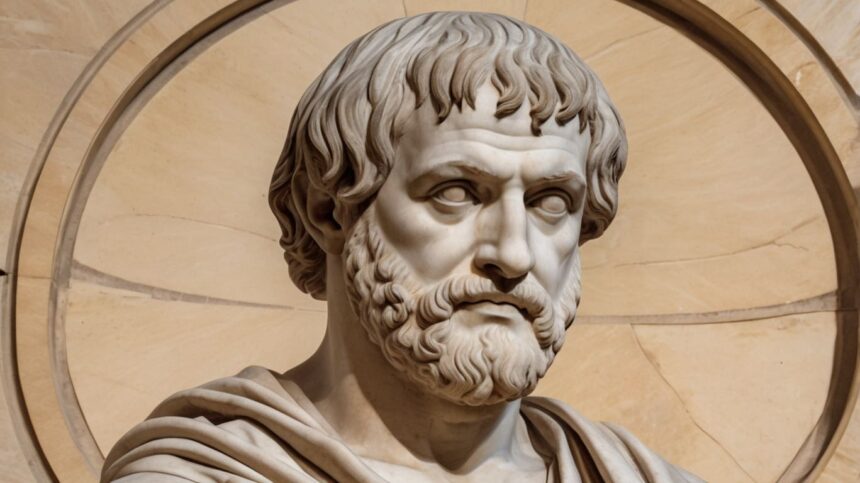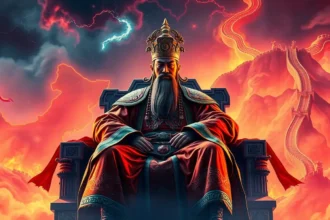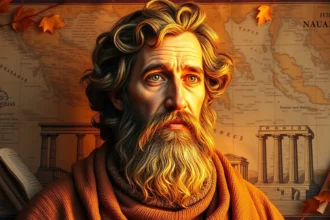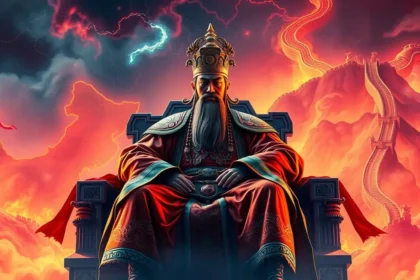Aristotle, born in 384 BCE in Stagira, a small city in northern Greece, has been celebrated for millennia as one of the greatest intellectual figures of human history. His contributions span a staggering array of subjects, including philosophy, logic, biology, ethics, metaphysics, and politics. From his early days as a student in Plato’s Academy to founding his own school, the Lyceum, Aristotle shaped the foundations of Western thought. Beyond academia, his influence extended to politics, notably as the mentor of Alexander the Great.
The roots of education are bitter, but its fruit is sweet—knowledge rewards effort eternally
Aristotle
Aristotle’s works are not only vast but also profound, blending observation, logic, and reasoning to explore questions of existence, purpose, and the natural world. This article delves into the details of Aristotle’s life, philosophy, and teachings, highlighting the profound impact he has had on human civilization.
Early Life and Education
Aristotle’s early years were steeped in intellectual curiosity, thanks to his father, Nicomachus, a physician serving the Macedonian king. This familial connection to the Macedonian court likely gave Aristotle access to resources and a scientific outlook from a young age. However, tragedy struck early with the death of both his parents, leaving Aristotle under the care of a guardian.
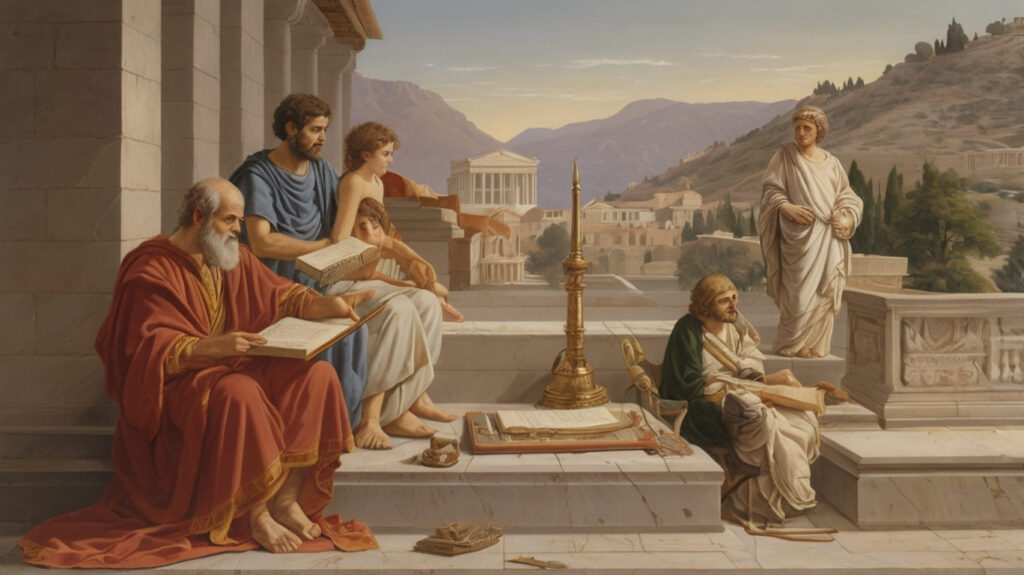
At 17, Aristotle’s intellectual journey began in earnest when he moved to Athens to join Plato’s Academy. There, he spent two decades immersed in the study of philosophy, mathematics, and the natural sciences. Plato’s teachings deeply influenced him, but Aristotle soon began to diverge from his mentor’s ideals. While Plato emphasized abstract forms and idealism, Aristotle leaned towards empiricism—the belief that knowledge is grounded in sensory experience and observation.
This intellectual independence became a hallmark of Aristotle’s philosophy and eventually prompted him to break away from Plato’s Academy.
The Wanderer: Traveling and Tutoring Alexander
After Plato’s death in 347 BCE, Aristotle left Athens and began a period of extensive travel. He spent time in Asia Minor, engaging in fieldwork that deepened his knowledge of biology and zoology. His studies during this period were groundbreaking; he meticulously observed animals, cataloging their behaviors, anatomy, and reproduction.
In 343 BCE, Aristotle was invited by King Philip II of Macedon to tutor his son, Alexander. This relationship was mutually beneficial. Aristotle imparted knowledge of philosophy, ethics, and governance to Alexander, while his association with the Macedonian court enhanced his influence and standing.
Aristotle’s teachings emphasized moderation, rational leadership, and cultural appreciation. Though Alexander later veered towards imperial conquest, his admiration for Greek culture and ideas is often attributed to Aristotle’s mentorship. Alexander reportedly carried Aristotle’s works during his campaigns, underscoring the philosopher’s enduring influence on his pupil.
Return to Athens: Founding the Lyceum
In 335 BCE, Aristotle returned to Athens and founded the Lyceum, an institution that rivaled Plato’s Academy. Unlike the Academy, the Lyceum emphasized empirical research and interdisciplinary study. Students at the Lyceum, known as Peripatetics, engaged in walking discussions, reflecting the school’s dynamic and explorative approach to knowledge.
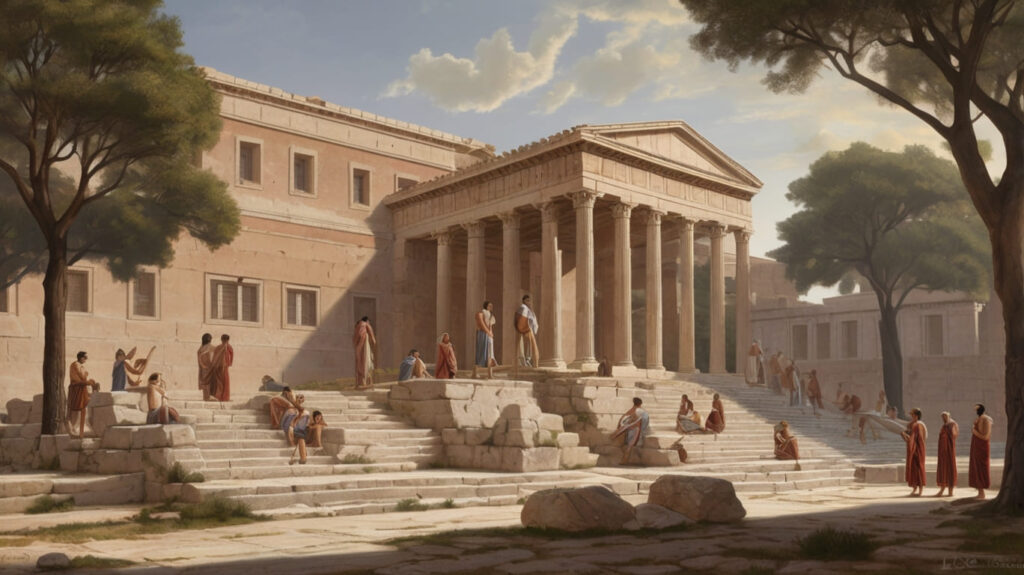
The Lyceum also served as a repository of knowledge. Aristotle and his students collected manuscripts, biological specimens, and artifacts, creating one of the earliest models of a research university.
Aristotle’s Philosophy and Major Works
Metaphysics: The Nature of Reality
Aristotle’s Metaphysics addressed questions about existence, causality, and the divine. He proposed the idea of substance as the essence of being and introduced the “four causes” to explain phenomena:
- Material Cause: What something is made of.
- Formal Cause: The form or blueprint of an object.
- Efficient Cause: The agent or process that brings something into being.
- Final Cause: The purpose or end goal of an object.
Aristotle’s concept of the “unmoved mover” suggested the existence of a prime force that initiated all motion and change without itself being affected—a precursor to later theological ideas about God.
Ethics and the Golden Mean
In Nicomachean Ethics, Aristotle explored the concept of virtue as a balance between deficiency and excess. For instance:
- Courage lies between recklessness and cowardice.
- Generosity lies between wastefulness and stinginess.
This balance, called the Golden Mean, is achieved through reason and practice. Aristotle believed that living virtuously leads to eudaimonia—human flourishing or happiness.
Key idea: Virtue is not innate but cultivated through habit. By repeatedly practicing virtuous actions, individuals develop a moral character that aligns with rationality and balance.
Politics: The Ideal State
For Aristotle, politics was an extension of ethics on a larger scale. In Politics, he argued that the state exists to enable citizens to achieve virtue and happiness. He analyzed various forms of government, concluding that a mixed government—a blend of democracy and oligarchy—was the most stable and just.
Aristotle also stressed education as a critical function of the state, believing that informed citizens are essential for a flourishing society.
Logic: A Framework for Knowledge
Aristotle’s Organon introduced formal logic, including the syllogism—a logical structure that remains foundational in philosophy and mathematics.
Example of a syllogism:
- All humans are mortal.
- Socrates is human.
- Therefore, Socrates is mortal.
Aristotle’s logical methods laid the groundwork for scientific inquiry, emphasizing structured reasoning and evidence-based conclusions.
Natural Sciences: Bridging Philosophy and Observation
Aristotle’s contributions to biology and zoology were revolutionary. He observed and categorized hundreds of species, dissecting animals to understand their anatomy and reproduction. Though some of his conclusions (e.g., spontaneous generation) were incorrect, his approach to studying nature through observation and classification established principles of empirical science.
In Physics, Aristotle discussed motion, causation, and the nature of the physical world. His notion that objects have an inherent purpose (or “telos”) influenced scientific and philosophical thought for centuries.
Hidden Teachings and Less-Explored Works
Aristotle’s writings extend beyond his most famous works. For instance, in De Anima (On the Soul), he examined the connection between the mind, body, and soul, arguing that the soul is the form of the body and the source of life.
It is the mark of an educated mind to be able to entertain a thought without accepting it.
Aristotle
His Rhetoric explored the art of persuasion, emphasizing the importance of ethos (credibility), pathos (emotional appeal), and logos (logical argument). These principles remain central to modern communication and public speaking.
Death and Final Years
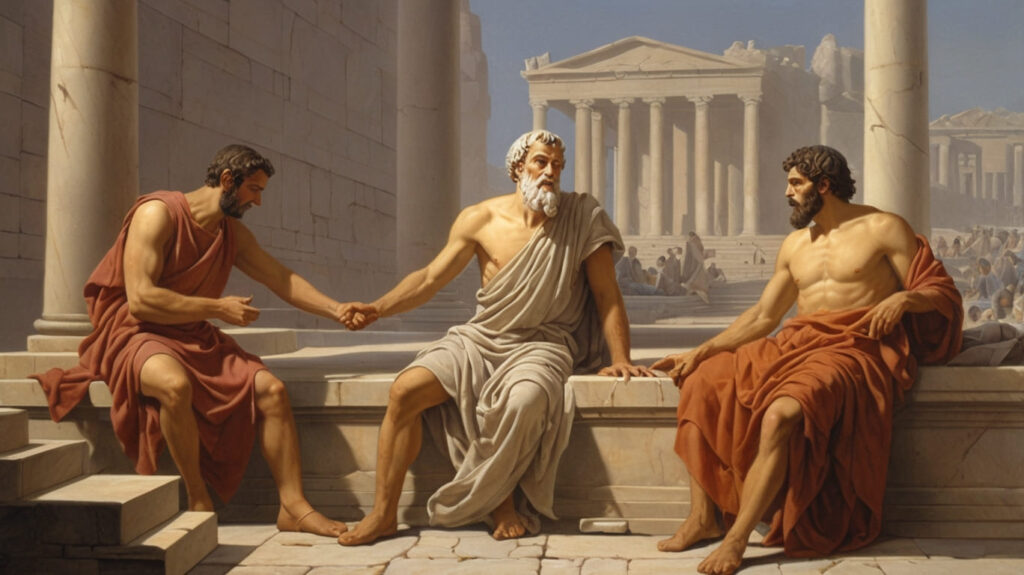
In 323 BCE, after Alexander’s death, anti-Macedonian sentiment in Athens forced Aristotle to flee. He retreated to Chalcis, where he died in 322 BCE, likely of natural causes. Reflecting on his departure from Athens, Aristotle is said to have remarked, “I will not allow the Athenians to sin twice against philosophy,” referencing Socrates’ execution.
Legacy Across Millennia
Aristotle’s influence has permeated every discipline of human thought:
- Philosophy: His emphasis on logic and empiricism shaped Western intellectual traditions.
- Science: His methods of classification and observation influenced scientific inquiry.
- Education: The Lyceum’s multidisciplinary approach inspired the modern university model.
During the Middle Ages, Islamic scholars like Avicenna and Averroes preserved and expanded Aristotle’s works, ensuring their transmission to Europe. The rediscovery of Aristotle during the Renaissance revitalized European thought, shaping the fields of philosophy, science, and politics.
Aristotle’s Wisdom in Everyday Life
Aristotle’s teachings resonate in contemporary life:
- “Knowing yourself is the beginning of all wisdom.”
- Self-awareness is foundational for personal and professional growth.
- “The more you know, the more you realize you don’t know.”
- Lifelong learning requires humility and curiosity.
- “We are what we repeatedly do. Excellence, then, is not an act, but a habit.”
- Success comes from consistency and discipline.
Final Thoughts: A Life of Timeless Inquiry
Aristotle’s legacy is a testament to the enduring power of knowledge and teaching. His works offer insights not only into philosophy and science but also into how we live, govern, and understand the world. As a student, teacher, and thinker, Aristotle exemplified the boundless potential of human inquiry.
In his own words: “Educating the mind without educating the heart is no education at all.”
Aristotle’s teachings remain a guiding light for humanity, reminding us that wisdom lies at the intersection of reason, virtue, and action.
Additional Resources
Here’s a list of additional resources related to Aristotle’s life, teachings, and legacy, complete with links for further exploration:
1. Aristotle: The Desire to Understand by Jonathan Lear
This book provides an accessible and thought-provoking examination of Aristotle’s philosophical ideas and their relevance today.
2. Stanford Encyclopedia of Philosophy: Aristotle
An authoritative and in-depth online resource that covers Aristotle’s works, key philosophical concepts, and enduring influence.
3. The Complete Works of Aristotle: The Revised Oxford Translation
This two-volume collection includes all of Aristotle’s extant works, translated and annotated for modern readers.
4. Aristotle’s Works on Project Gutenberg
Many of Aristotle’s original writings, such as Nicomachean Ethics and Politics, are available for free in the public domain.
5. Internet Encyclopedia of Philosophy: Aristotle
A comprehensive guide to Aristotle’s life, philosophy, and influence, written for both scholars and general readers.
6. Aristotle and the Lyceum: The Birth of Empirical Science (Documentary)
This engaging documentary explores Aristotle’s scientific methods and the impact of his Lyceum on modern research.
7. Aristotle’s Impact on Medieval Thought (Academic Articles)
Explore scholarly articles on how Aristotle’s works were preserved and expanded by Islamic and European scholars.
These resources offer an excellent starting point for diving deeper into Aristotle’s philosophy, scientific legacy, and historical significance. Let me know if you’d like more tailored suggestions or help accessing any of these!
Must Read : History of the Mughal Empire


